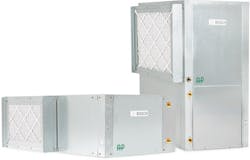
Consumers and commercial building owners alike are seeking environmentally friendly HVAC technologies that have the potential to reduce energy usage. Water source heat pumps are becoming more popular because they are at least three to four times more energy efficient than conventional systems. Right now, the market is seeing a surge in demand due in part to federal rebates, such as those in the Inflation Reduction Act.
Water source heat pumps work by using energy from the ground or surface water to heat and cool buildings. Following are annual “checkup” maintenance tips for water source heat pumps:
1. Filter changes or cleaning are required at regular intervals. Some commercial applications will need to have the filters changed twice per month, but in single-family homes, replacing or cleaning the filter every 60 days is sufficient.
2. An annual checkup is recommended by a licensed service professional. Recording the performance measurements of volts, amps, air temperatures and water temperatures are recommended to compare against the info on the unit’s data plate, which was recorded at the original startup of the equipment.
3. If electrical problems are indicated, check volts, amps, and resistance of components to determine if connection or component issues exist. Faulty electrical components should be replaced as necessary, and proper electrical flow should be verified.
4. During annual checkup, if air flow problems are indicated, adjust air flow volume as necessary by blower speed or interface board adjustments to match manufacturer’s rated air flow for the unit during the cooling and/or heating mode.
5. Check and clean coils with commercially available coil cleaner if necessary. It is important to use a chemical cleaner that is specifically designed for coils to avoid damage.
6. If waterside problems are indicated, check the temperature difference and pressure drop across the coaxial coil to determine gallons per minute of water flowing and capacity. Applying the data to industry-related formulas and calculations will indicate whether further water/fluid issues exist, such as heat exchanger problems, fluid volume problems or fluid flow problems.
7. If refrigerant problems are indicated, check superheat and subcooling to determine the level and location of existing liquid refrigerant in the refrigerant circuit. Pressure and temperature charts help determine refrigerant circuit component or charge level issues. If necessary, replace refrigerant circuit components or adjust refrigerant charge level, based on industry-accepted procedures.
8. Check the condensate drain annually by cleaning and flushing to insure proper drainage.
9. Periodic lockouts (shutdowns as a protective measure) almost always are caused by air flow problems. If continual lockouts occur, check for air flow problems or air temperature problems.
When properly cared for, heat pumps are highly adaptable to changing weather conditions, meaning they can provide consistent performance throughout the year—and for many years to come.
Visit: www.boschheatingandcooling.com.
About the Author
Phil Rains
Application Engineer & Trainer
Phil Rains is an application engineer and trainer for Bosch Thermotechnology with a focus on commercial water source/geothermal heat pumps. He has over 50 years of experience in the HVACR industry.
